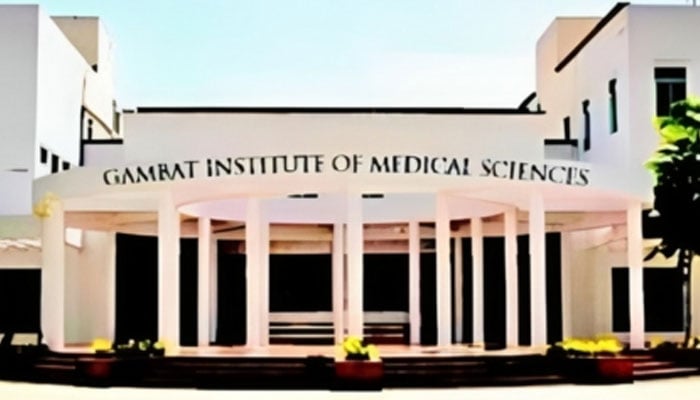Gambat Institute of Medical Sciences makes history with advanced heart surgery
In a groundbreaking achievement, cardiac surgeons at the Gambat Institute of Medical Sciences (GIMS) have successfully performed the first-ever hybrid coronary revascularisation procedure on a patient with ‘Three Vessel Coronary Artery Disease’.
The procedure, conducted last month, marks a significant milestone in cardiac care for the region and is the first of its kind in Pakistan. The hybrid coronary revascularisation involves a simultaneous approach combining LIMA to LAD graft and stenting of the left circumflex coronary artery. This innovative procedure is particularly important for patients with complex coronary artery disease, especially those with multi-vessel coronary artery disease, poor heart function, or those who are high-risk candidates for conventional surgery.
It allows for the benefits of both surgical and interventional techniques, leading to improved outcomes and reduced recovery times. Dr Rahim Bux Bhatti, the head of GIMS, reported that the patient was stable and recovering well after the procedure. The successful completion of this complex surgery underscores the advanced capabilities and dedication of the medical team at the institute.
Sindh Chief Minister Syed Murad Ali Shah expressed his appreciation for the Gambat Institute team. He congratulated Director Gambat Institute Dr Rahim Bux Bhatti, along with cardiac surgeons Prof. Mudassir Iqbal Dar, Dr Hosh Muhammad, and Dr Muhammad Farhan Khan, for their significant achievement in enhancing healthcare for the people of Sindh.
The procedure’s success not only highlights the expertise of the medical team but also represents a significant step forward in providing advanced cardiac care within the region, offering new hope for patients with complex coronary artery conditions.
The hybrid coronary revascularisation is significant because it combines the long-term benefits of coronary artery bypass grafting with the less invasive nature of percutaneous coronary intervention, providing a comprehensive treatment option that is tailored to the needs of the patient.
-
 Is Elon Musk Set To Become First Trillionaire In 2026? Market Odds Explained
Is Elon Musk Set To Become First Trillionaire In 2026? Market Odds Explained -
 Prince Harry’s Protective Stance On Meghan Markle Sparked Rift With William, Charles
Prince Harry’s Protective Stance On Meghan Markle Sparked Rift With William, Charles -
 How BTS Push Through Performances As They Gear For 2026 Comeback
How BTS Push Through Performances As They Gear For 2026 Comeback -
 AI Copyright Battle: ByteDance To Curb Seedance 2.0 Amid Disney Lawsuit Warning
AI Copyright Battle: ByteDance To Curb Seedance 2.0 Amid Disney Lawsuit Warning -
 Savannah Guthrie In Tears As She Makes Desperate Plea To Mom's Kidnappers
Savannah Guthrie In Tears As She Makes Desperate Plea To Mom's Kidnappers -
 Canada’s Defence Industrial Strategy Targets 125,000 Jobs And Export Growth
Canada’s Defence Industrial Strategy Targets 125,000 Jobs And Export Growth -
 Tre Johnson, Former NFL Guard And Teacher, Passes Away At 54
Tre Johnson, Former NFL Guard And Teacher, Passes Away At 54 -
 Jerome Tang Calls Out Team After Embarrassing Home Defeat
Jerome Tang Calls Out Team After Embarrassing Home Defeat -
 Cynthia Erivo Addresses Bizarre Rumour About Her Relationship With Ariana Grande
Cynthia Erivo Addresses Bizarre Rumour About Her Relationship With Ariana Grande -
 Prince Harry, Meghan Markle Spotted Cosying Up At NBA All-Star Game
Prince Harry, Meghan Markle Spotted Cosying Up At NBA All-Star Game -
 Lady Gaga Explains How Fibromyalgia Lets Her 'connect With People Who Have It'
Lady Gaga Explains How Fibromyalgia Lets Her 'connect With People Who Have It' -
 Metro Detroit Weather Forecast: Is The Polar Vortex Coming Back?
Metro Detroit Weather Forecast: Is The Polar Vortex Coming Back? -
 Daniel Radcliffe Reveals Surprising Way Fatherhood Changed Him
Daniel Radcliffe Reveals Surprising Way Fatherhood Changed Him -
 ‘Disgraced’ Andrew At Risk Of Breaking Point As Epstein Scandal Continues
‘Disgraced’ Andrew At Risk Of Breaking Point As Epstein Scandal Continues -
 Alan Cumming Shares Plans With 2026 Bafta Film Awards
Alan Cumming Shares Plans With 2026 Bafta Film Awards -
 OpenClaw Founder Peter Steinberger Hired By OpenAI As AI Agent Race Heats Up
OpenClaw Founder Peter Steinberger Hired By OpenAI As AI Agent Race Heats Up




